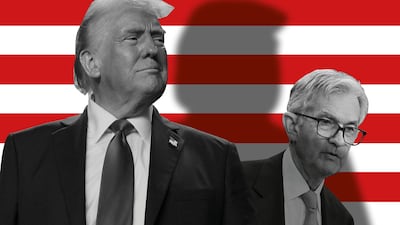Federal Reserve Chairman Jerome Powell entered a new political reality when the central bank cut rates on Thursday: one in which previous and future president Donald Trump believes he can fire him.
Normally one to provide deep, thoughtful responses on his perspective of policy, Mr Powell was uncharacteristically short when pressed if he would resign if Mr Trump asked him to. "No", he said.
The exchange came shortly after the Fed cut interest rates for a second consecutive meeting. Mr Powell tried to keep the conference focused on policy, either deflecting questions on politics or delivering short answers.
When asked if a president has the authority to fire or demote the Fed chair or any Fed governor over a policy disagreement, Mr Powell delivered another short message: "Not permitted under the law."
This week's Fed meeting arrived at an awkward time, days after Mr Trump romped back to power during the presidential election.
Mr Trump, who nominated Mr Powell to his first term in 2017, made no secret of his frustration with the Fed chairman during his previous presidential term. In 2019, Mr Trump questioned if Mr Powell was a "bigger enemy" to the US than Chinese President Xi Jinping because of a disagreement on monetary policy.
No Fed chair has ever been fired, nor has it ever been tested. The Fed is a non-partisan agency created by Congress, and the central bank fiercely guards its independence. While nominated by the president, the Fed chair and governors who serve on the board are confirmed by the Senate.
Fed chairs serve four-year terms, with the cycles designed to not overlap with the presidential election, and can only be fired "for cause".
"The law is clearly designed that to protect these people from the whim of the President, but on the other hand, it's not clear how much cause is needed or what 'cause' really means. It's never been tested before, but I think the Fed has always thought, no, they're safe unless they actually literally do something illegal or grossly unethical," said Joseph Gagnon, an economist at the Peterson Institute for International Economics.
Earlier on Thursday, CNN reported that Mr Trump would "allow" Mr Powell to serve the remainder of his term, although that still suggests Mr Trump believes he has a say over the Fed chairman's tenure.
The only possible way to change such a thing would be through congressional action. Some Republicans have shown interest in the Fed's monetary policy decisions, POLITICO reported, although any changes to the Federal Reserve Act remain purely theoretical for now.
"It's a pretty big red line to cross relative to history," said John Leahy, professor at the University of Michigan and a former Fed economist.
Barring a surprise resignation, the only way Mr Trump can have a direct or indirect impact on the Fed will be replacing Mr Powell once his term expires in 2026.
But that hasn't stopped lawmakers from trying to interject their own opinions in public appearances or lambast the central bank. Mr Trump even accused the Fed of "playing politics" when it cut interest rates by 50 basis points in September.
Mr Trump's return to office poses uncertainties of its own.
Treasury yields have risen in the days since the election on speculation that Mr Trump's tariffs and tax cut proposals would increase the fiscal deficit and raise inflation.
The latter would require the Fed to raise interest rates during a time when they are attempting to land a so-called soft landing.
When asked by one reporter how the Fed would act proactively or reactively to a new administration's policies, Mr Powell read from a prepared statement.
"In the near term, the election will have no effects on our policy decisions," he said.
"We don't know what the timing and substance of any policy changes will be. We therefore don't know what the effects on the economy, specifically, whether the delight sent those policies would matter. We don't guess, we don't speculate, and we don't assume."


